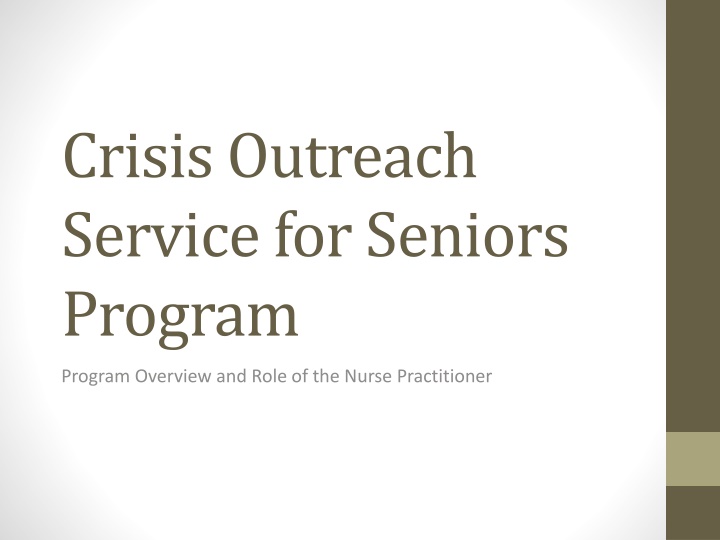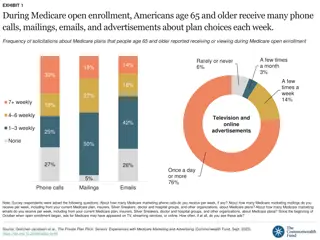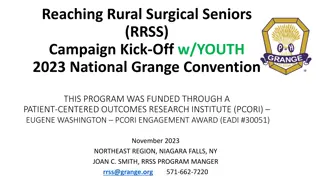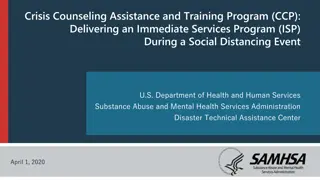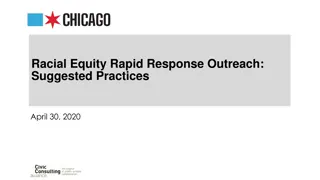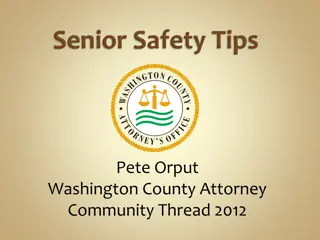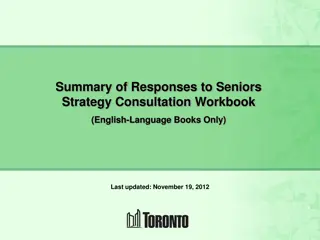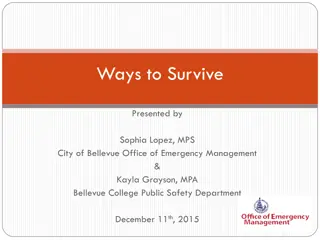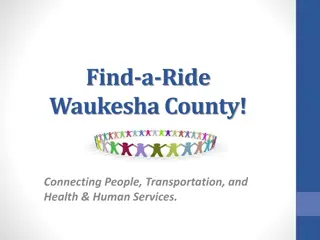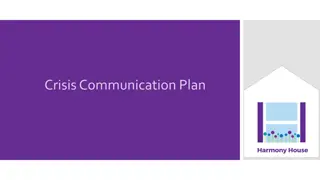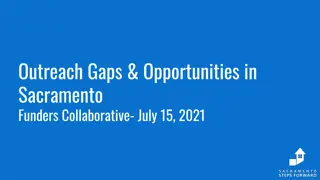Crisis Outreach Service for Seniors Program Overview and Role
COSS Mobile crisis intervention and outreach service for seniors aged 65+ (exceptions for 55+), focusing on mental health, addictions, and frailty. The program provides comprehensive care in the community, crisis counseling, case management, and health assessments. Referrals accepted from various sources without needing prior consent.
Download Presentation

Please find below an Image/Link to download the presentation.
The content on the website is provided AS IS for your information and personal use only. It may not be sold, licensed, or shared on other websites without obtaining consent from the author.If you encounter any issues during the download, it is possible that the publisher has removed the file from their server.
You are allowed to download the files provided on this website for personal or commercial use, subject to the condition that they are used lawfully. All files are the property of their respective owners.
The content on the website is provided AS IS for your information and personal use only. It may not be sold, licensed, or shared on other websites without obtaining consent from the author.
E N D
Presentation Transcript
Crisis Outreach Service for Seniors Program Program Overview and Role of the Nurse Practitioner
COSS Mobile crisis intervention and outreach service For seniors age 65+ but exceptions may be made for those 55+ Focus on suspected or diagnosed mental health and/or addictions including dementias Frail, isolated, marginalized, hard to serve Risk of repeated ED visits
Intake and Referral Through Toronto Seniors Help Line (TSHL) (416) 217-2077 8 full-time staff (registered professionals) and 4 relief staff Operates 365 days/year (9:00am 8:00pm Monday to Friday and 10:00am-6:00pm weekends and stat holidays) Covers City of Toronto (Toronto Central LHIN focused) Approximately 1400 calls/month Interpretation services in 100+ languages
COSS Role Two person outreach team between 9 am 5 pm Makes every effort to make direct in-person contact with the client same day or next day, depending on urgency Does not need in-advance client consent - team will visit in-person and request consent at the time Comprehensive care in the community including individuals homes, supportive housing sites, drop-ins, community centres, etc.
COSS Services and Supports Crisis counseling Short-term intensive crisis & case management such as initiating community services, i.e. personal support workers, home care, Meals on Wheels, specialized older adult services and day programs. Supports & strategies around harm reduction, mental health, addictions, responsive behaviours Health assessment & care as needed; linkages to long term primary care Warm transitions to follow-up case management services for seniors Support individuals typically for 6 8 weeks
Referral Process Referrals accepted from anyone! Individuals Friends, family, neighbours, or community members Physicians Community Health Centre staff Hospital ED staff Hospital Social Workers and Discharge Planners LHIN Case Coordinators Community Service Provider staff, TCHC staff, private landlords Police, Toronto Fire, Toronto Paramedic Services Consent is not required for a referral the COSS team will visit in- person and request consent at that time
Role of the Nurse Practitioner Role is 100% outreach Mingled with social issues, clinical primary care and/or navigation through the health care system often contributes to the crisis NP assesses the clinical situation and working with the client, other members of COSS and the circle of care, develops a clinical plan of care Typical client is one who has not connected well to primary care
Common Presentations to NP Under-managed chronic diseases such as HTN, diabetes, hypothyroidism Undiagnosed neurocognitive disorders that have contributed to the current crisis including responsive behaviours Undiagnosed or under-managed mental health conditions or addictions Presentations which may require work up and specialist referrals
Levels of Engagement for NP
Client Has No Primary Care This is common: previous PCP has retired, died or the client has moved NP conducts a comprehensive geriatric assessment: physical and mental health. May include: diagnostic testing labs standardized cognitive and mental health assessments Plan of care put in place within 24 hours of initial visit
No PCP cont. The plan may include prescriptions for medications, specialist referrals, TC-LHIN referrals, suggestions for managing responsive behaviours etc. Including collaboration with pharmacies for blister packs, delivery schedules etc. The NP maintains the role of PCP until the client has been connected or re-connected to permanent primary care, makes the transition to LTC and/or the crisis is resolved
Has Primary Care but Connection Lost Cognitive impairment, mobility issues, lack of finances, no phone, housing move, conflict with PCP etc. are some of the reasons people lose connection to primary care NP does updated health assessment using information gleaned from a variety of sources Ideally consent obtained to communicate with original PCP and help the client re-integrate into the practice
Has Primary Care Even though some clients have primary care there may be situations over and above what the PCP is able to manage in an office setting, for example clients with multiple health conditions, cognitive disorders, lack of family support and other social issues such as housing issues NP will complete a comprehensive geriatric assessment Ideally consent obtained to send this assessment to PCP
Community Outreach Outreach clinic once per week at Haven Toronto (formerly the Good Neighbour s Club) Haven Toronto is a COSS partner Younger subset of clients usually 50 s and 60 s with substance related issues and often homelessness
Community Outreach cont. Diagnoses and treats acute illnesses e.g. AECOPD, headache, MSK issues etc. May renew meds if PCP is geographically distant Assist with navigating health care system many clients don t have a phone or permanent address making care coordination challenging Financial optimization low barrier completion of Special Diet forms, Transportation forms and ODSP application
Role for Primary Care Nurses Client-Centred Care Access Health professionals work together to optimize the health and wellness of clients and involve the client in decision making Collaboration ensures the client will receive the most appropriate health-care provider at the right time and place Inter-professional Collaboration Social Justice and Equity Communication Inter-professional collaborative care linked to social justice, equity and determinants of health Information sharing and decision- making Positon Statement CNA, Interprofessional Collaboration, November 2011
Benefits and Outcomes System and Client System Outcomes Fewer ED, EMS and police calls Better use of community supports Reconnection with primary care Client Achieve complex goals like cataract surgery Avoid evictions/find more appropriate housing Avoidance of LTC or successful LTC transitions
Case Example #1 ST 69 year old male Client referred by his lawyer Presenting Issues: Living with a roommate and sharing expenses Roommate was admitted to hospital and not expected to return home Client having difficulties with own health and maintaining the rent Has been issued eviction order for non-payment
Presenting Issues cont. Unit has bedbugs Taxes not done in 2 years No family doctor/PCP only a methadone doctor who is prescribing all meds including methadone
Health History (Hx) Hx of extensive and long multi-drug use Has not used drugs for 13 years and continues to take Methadone OA several joints and CLBP Sciatica Previous tibia and fibula # RLS Chronic pain Possible Hernia repair client wasn t sure
Medications Risperidone (unable to find reason for this Rx) Duloxetine Rabeprazole Baclofen Atorvastatin Colace/MOM ASA low dose Melatonin for sleep Methadone
Role of NP Full functional assessment performed including: General health hx Focused depression screening scored 12/15 on GDS Detailed assessment for neuropathic pain General screening blood work done as not done for a while Rx written for Acetaminophen as client was purchasing this Referral to geriatric psychiatry for psycho- tropic med assessment Advocating for resumption of methadone carries
Assessment cont. Also assessed geriatric issues Continence Falls Nutrition and diet Sleep Ability to perform ADLs and IADLs Environment
Resolution Geriatric psychiatrist adjusted meds (d/c ed Risperidone, optimized Duloxetine) Social worker assisted with getting taxes done and optimizing income SW helped find new place to live more affordable and help with furniture bank Connected to permanent PCP, not only methadone doctor and warm handoff completed
Case Example #2 TC 76 year old male Referred by hospital social worker after client was in ED d/t a fall Presenting Issues: Severe bedbug infestation Allowing strangers into apt. who then steal from him Falls Has PCP provider but not connecting
Health Hx DMT2 hx of high blood sugars but not on any meds Falls Undiagnosed tremor and unstable balance Past hx of anemia and hypotension No medications currently prescribed
Role of NP Comprehensive health review Special focus on gait, TUG test (38.5 seconds), neuro assessment Focused cognitive assessment MoCA scored 20/30 with deficits in executive functioning and delayed recall Repeated blood work as remote Referral to neurology
Resolution NP initiated Metformin for DM With consent sent all assessments, labs and consults to family doctor SW arranged for respite bed for extreme clean to be done PSW support optimized LTC application completed for client to wait in the community
Thank You Questions Contact Carolyn Pitchot @ Cpitchot@srchc.com
